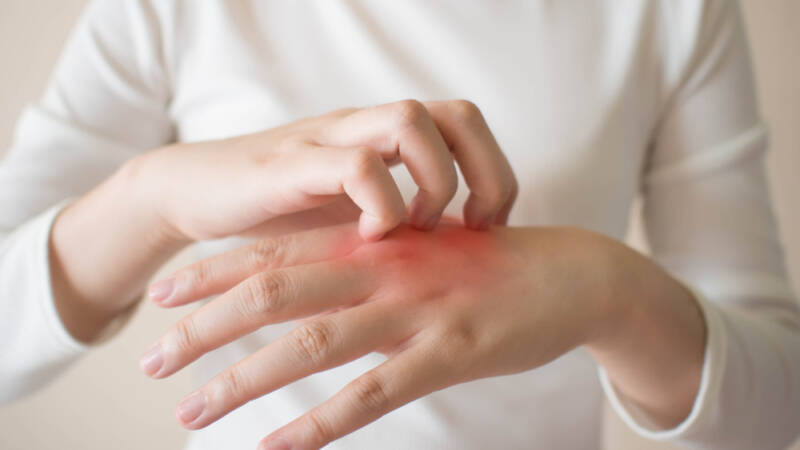Everything You Need To Know About Eczema

According to the National Eczema Association, 31.6 million people (10.1% of the population) in the United States have some form of eczema – a chronic condition that causes skin to become red and itchy. It’s an extremely common diagnosis – particularly in children – however if left unchecked, flare ups can cause significant discomfort.
What Is Eczema?
Eczema is generally characterized by dry, discolored, itchy, and inflamed patches of skin, which can occur anywhere on the body. There are seven subtypes – none of which are contagious – though the most common is atopic dermatitis. While some people outgrow the condition, others continue to experience eczema into adulthood.
Symptoms Of Eczema
The signs and symptoms of eczema vary slightly, affecting people differently based on age. Some of the symptoms for each age group include:
Infants
- Extremely itchy rashes, often on the cheeks or scalp
- Skin infections, if scratching or rubbing is prolonged
- Fluid oozing from rash area, if scratching or rubbing is prolonged
Toddlers and Children
- Dry and scaly rashes on the knees, elbows, neck, ankles, wrists, and upper legs
- Rashes may become bumpy (in younger children)
- Discoloration, if rashes persist for a prolonged period of time
Teenagers and Adults
- Scaly rashes
- Extremely dry and itchy skin
- Rashes can potentially cover large portions of the body, but are often on the knees, elbows, neck, face, and eyelids
- Skin infections, if scratching or rubbing is prolonged
Causes and Triggers
Despite being a common ailment, medical professionals don’t entirely know what causes eczema. However there are a number of known triggers that intensify symptoms. These common factors include:
- Allergens – The terms “allergen” and “atopy” go somewhat hand-in-hand, since atopy refers to situations where the body enacts an exaggerated immune response to combat relatively harmless environmental substances. Some of the most common allergens that induce and exacerbate eczema include pollen, pet dander, mold, and dust mites.
- Irritants – Similarly to allergens, there are several common irritants that affect eczema. A few of the most common examples are detergents, disinfectants, soaps, and shampoos.
- Hormones – Women are primarily at risk when it comes to the effects of hormones on eczema flare-ups. More specifically, hormone levels affect flare-ups when they’re fluctuating significantly, such as during menstruation or pregnancy.
- Temperature – If the temperature or humidity of a person’s surroundings drifts too far into either end of the spectrum – too hot or too cold – an eczema flare-up can occur.
- Stress – Compared to the aforementioned causes, the link between stress and eczema flare-ups is tenuous. However, some people who suffer from eczema believe that stress can indeed make the symptoms of eczema noticeably worse.
- Food – Some studies have shown that eggs, nuts and seeds, wheat, dairy, and soy can cause eczema flare-ups, but this is uncommon.
Treatment Options
Currently, there is no known cure for eczema. As a result, treatments are focused on alleviating symptoms and healing areas of the skin that have been affected.
Common Medications
- Topical corticosteroid ointments and creams – Anti-inflammatories that relieve the main symptoms of eczema, including itchiness
- Antibiotics – If eczema occurs alongside a bacterial skin infection
- Antihistamines – To achieve drowsiness to reduce nighttime scratching
- Phototherapy – Exposure fo ultraviolet A or B to treat moderate dermatitis
- Systemic corticosteroids – Short-term medication that is ingested or injected if topical options are not working
- Barrier repair moisturizers – Reduce water loss and repair the skin
- Anti-fungal/anti-viral medications – Treat fungal or viral infections
At-Home Treatments
- Moisturizing daily, particularly right after bathing
- Taking lukewarm baths
- Air drying instead of using a towel
- Using non-soap cleanser or mild soaps
- Wearing loose-fitting clothing made from cotton or other soft fabrics
- Avoiding activities that cause excessive sweating
While these at-home treatments can certainly lessen the symptoms of eczema, its important to come up with a robust treatment plan for you or your child. If you have any of the symptoms of eczema please consult your doctor.